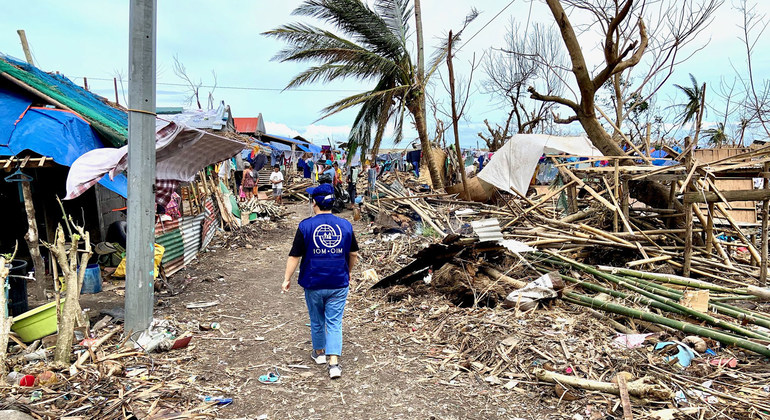The State of the Climate in the South-West Pacific 2020 is part of a new series of regional climate reports by the UN weather agency, and covers much of Southeast Asia as well as Australia, New Zealand, and the Pacific Islands.
Real and potential risks
The report and accompanying story map were launched at the COP26 UN climate change conference in Glasgow, Scotland, where the existential threat to many Small Island Developing States (SIDS) has been among the recurring themes.
“This report highlights the real and potential risks associated with the changes occurring in ocean circulation, temperature, acidification and deoxygenation, as well as rising sea level. The Small Island Developing States are increasingly vulnerable to these changes, as their incomes are highly linked to fisheries, aquaculture and tourism,” said Petteri Taalas, the WMO Secretary-General.
Coral reefs degraded
The report provides a snapshot of climate indicators, and their risks and impacts on economies, society and the environment. It details threats on land and at sea.
WMO said sea surface temperatures and ocean heat in parts of the southwest Pacific are increasing at more than three times the global average rate. “Marine heatwaves” have bleached once vibrant coral reefs and threaten the vital ecosystems the region depends on.
Last year, the Great Barrier Reef region of Australia suffered widespread coral bleaching, the third time in the past five years. WMO warned that if global temperature rises 2 degrees Celsius above pre-industrial levels, 90 per cent of the coral reefs there and in the Coral Triangle, could suffer severe degradation.
Fisheries in decline
Ocean warming, deoxygenation and acidification are also changing the ocean’s circulation pattern and chemistry, forcing fish and zooplankton to migrate to higher latitudes and change behaviour, thus altering traditional fisheries.
Pacific islands have been particularly affected as coastal fishing provides food, welfare, culture and employment. The report found that between 1990 and 2018, total fisheries production decreased by as much as 75 per cent in Vanuatu, and 23 per cent in Tonga.
Tropical glaciers disappearing
Global mean sea level has risen at an average rate of about 3.3 mm per year since the early 1990s and has accelerated as a result of ocean warming and land-ice melt.
Rates of sea-level change in the north Indian Ocean and the western part of the tropical Pacific Ocean are substantially higher than the global mean rise, according to the report.
WMO added that sea level rise is already having a major impact on society, economies and ecosystems in Pacific islands, and increases vulnerability to tropical cyclones, storm surge and coastal flooding.
The last remaining tropical glaciers between the Himalayas and the Andes are also at risk due to climate change. The glaciers, located in Papua, Indonesia, have existed for some 5,000 years but at the current rate, total ice loss will be expected within the next five years.
Storms and wildfires
Meanwhile, storms and floods have triggered death, destruction and displacement in Southeast Asia and Pacific SIDS. The Philippines, as well as Pacific SIDS, have suffered greatly from typhoons and tropical cyclones, while droughts are also a major hazard.
The unprecedented 2019-2020 wildfire season in eastern Australia led to severe smoke pollution. More than 10 million hectares of land were burned, and some 33 people killed, along with millions of animals, while over 3,000 homes were destroyed.
The region’s push to achieve sustainable development is in jeopardy due to weather-related hazards, which are expected to become more extreme as a result of climate change.
Early warning systems
Between 2000 and 2019, extreme weather events such as tropical cyclones caused around 1,500 fatalities and affected close to eight million people per year, on average. Some 500 fatalities were reported in 2020, around one third of the long-term annual average, but more than 11 million people were affected.
The report advocates for Early Warning Systems as a “key adaptation measure” for reducing climate risks and impacts. Around three quarters of countries in the region do have multi-hazard early warning systems in place.
WMO added that addressing rising climate risks and their impacts requires action at the local, regional and transnational level, including in capacity building, development of climate services, and integrated disaster risk reduction approaches.
These are also critical to achieving sustainable development and building back better from the COVID-19 pandemic.



